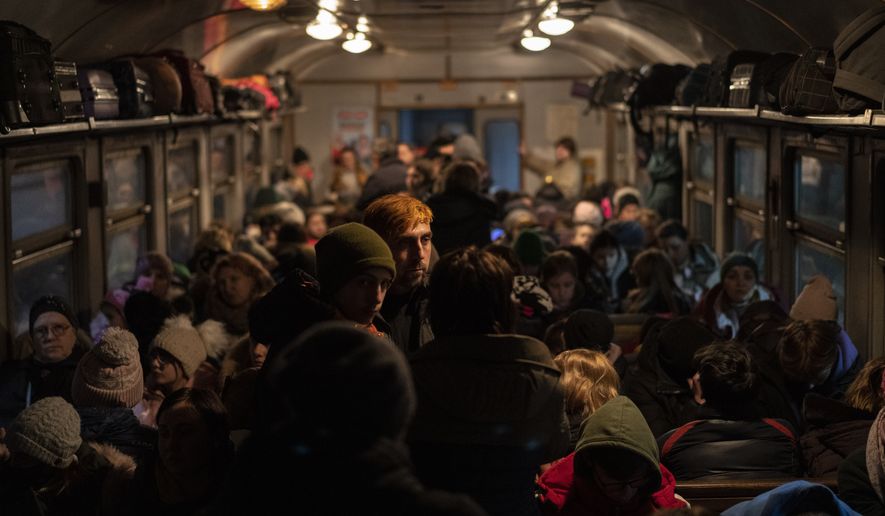KRAKOW, Poland — Lviv residents awoke Sunday to find war at their doorstep, with a major Russian assault pounding a key Ukrainian military facility in a region once thought to be a sanctuary.
Russian planes targeted the International Peacekeeping and Security Center in Yavoriv, which lies about 35 miles from the city of Lviv and just 15 miles from the Polish border. The bombing marked a shift in Russia’s battle plan and indicated that areas in Ukraine previously considered safe were now under attack.
Residents tried to carry on while Russian forces expanded their war in the west after meeting heavy resistance in their push to the capital, Kyiv.
One resident in Lviv said the city was filled with a flurry of sirens from ambulances and police cars Sunday morning but was functioning as normal beyond that.
Lviv Deputy Mayor Andriy Moskalenko told ABC News’ “This Week” program that it had been a tough night for his city, though Ukrainian air defenses took out many Russian missiles. He said the assault in western Ukraine is further proof that Russian President Vladimir Putin will do virtually anything to conquer the country.
“The whole world right now [has] to be engaged how to solve this problem,” he said.
SEE ALSO: U.S. view of Putin: Angry, frustrated, likely to escalate war
The assault in Yavoriv is further proof of Russia’s evolving strategy.
Russia conducted similar attacks in western regions of Ukraine over the past several days, taking out military airfields in Lutsk and Ivano-Frankivsk with high-precision, long-range weapons. Four Ukrainian servicemen were killed and six were wounded in the attacks in Lutsk, Mayor Ihor Polishchuk said.
Those attacks served as a reminder for some residents of Lviv, just over 100 miles southwest of Lutsk in the far reaches of yet unscathed western Ukraine.
“The war is not far,” said Bogdan Luk, a 29-year-old bartender in Lviv. “It can be here tomorrow.”
With a population of more than 700,000, Lviv has served as a haven for hundreds of thousands of Ukrainians escaping the war raging in the east. Many businesses have reopened since the initial invasion, and well-trafficked streets in the picturesque city center offer a small sense of normalcy in contrast with Kyiv and other cities gutted by war.
Still, residents say the relative peace could be shattered at any moment.
“The closer to here that the Russian troops come, the greater the possibility of an attack,” said Andrei Rybakov, 36, a doctor living in Lviv.
Further attacks could spark more emigration from Ukraine into neighboring nations such as Poland. U.S. officials visiting the Ukraine-Poland border said they witnessed heartbreaking scenes.
“It’s very sad. It’s very emotional. People talking about their homes being destroyed,” Sen. Rob Portman, Ohio Republican, told CNN on Sunday. “People talking about having to leave their loved ones behind, a lot of grandmothers with grandchildren. People are just distraught.”
In the nearly three weeks since the invasion, most in Lviv had become desensitized to the occasional air raid siren. Many residents have felt reassured, given Lviv’s proximity to Poland. Some say attacking a city housing hundreds of thousands of refugees would be a step too far even for Russia, despite its disregard for limiting civilian casualties in the east.
Mr. Rybakov said he thinks residents in Lviv are becoming more attentive to the brewing danger.
Others describe a tense scene of cafes filled with people and statues and stained glass in protective covering.
“It’s a very stark contrast between a city at peace and a city at war,” said Dimko Zhluktenko, 33, who worked as a software engineer and consultant before the invasion. “I would say the main goal of these attacks is to create panic among us so our economy cannot work the way it is supposed to.”
Although Lviv may be on edge, Mr. Zhluktenko said, the city is not likely to succumb to panic soon.
“It just adds a little more tension,” said Andrii Babkin, 42. “The locals [in Lviv] already understand that anything can happen. Literally anything.”
• Ben Wolfgang reported from Washington.
• Joseph Clark can be reached at jclark@washingtontimes.com.
• Ben Wolfgang can be reached at bwolfgang@washingtontimes.com.




Please read our comment policy before commenting.